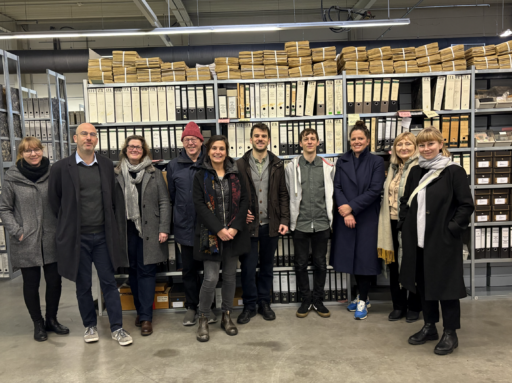EHRI Seminar: Citizen Science in the Archival Domain. A Hands-On Seminar on Implementing Crowdsourcing Projects for Micro-Archives

From 25 to 28 November 2024, the European Holocaust Research Infrastructure held the seminar ‘Citizen Science in the Archival Domain. A Hands-On Seminar on Implementing Crowdsourcing Projects for Micro-Archives’ hosted by the Leibniz Institute for Contemporary History and the Arolsen Archives in Bad Arolsen. Nine participants from Germany, Austria, Ukraine and the Netherlands spent four days exploring the opportunities and challenges of implementing crowdsourcing projects.
After an introduction, the seminar began with presentations on the EHRI project and its digital services as well as the history and holdings of the Arolsen Archives. The subsequent presentations gave a general overview of crowdsourcing in the field of cultural heritage and the Arolsen Archives’ experiences with their crowdsourcing initiative Everynamecounts (ENC). The participants spent the second half of the day and the following morning on a hands-on approach to crowdsourcing. Using death certificates from the holdings of the Arolsen Archives and so-called supplementary cards from the Federal Archives, they discussed the possibilities, difficulties and limitations of using these documents for a crowdsourcing project. The participants then created their own workflows on Zooniverse and compared their different implementations. The focus was on the data to be collected and the need to contextualize the documents.

This was followed by a presentation of the Hertie School’s scientific study accompanying ENC. The study, which will be published in early 2025, analyzes the impact of crowdsourcing projects. The results showed, among other things, that ENC participants were more motivated to engage in remembrance work and more willing to stand up against antisemitism.
Later on, the workshop participants were given an insight into the community management required for crowdsourcing projects. This included not only the necessary resources, but also the resulting collaboration with volunteers and the possible expansion and further opening of the archive. In the afternoon, the new tool of the Arolsen Archives was presented, which has been specially developed to create workflows for ENC. Another presentation focused on the data processing steps after a project has been completed.

On the last day, the participants were able to take part in a guided tour of the archive and thus gain a deeper insight into the holdings of the Arolsen Archives.
The following presentation on previous ENC geo-workflows showed examples of complex workflows and the particular opportunities of crowdsourcing through the collective knowledge and additional research of the volunteers. The event concluded with a presentation on the devastating effects of the Russian war of aggression on microarchives in Ukraine, and the H-Files project launched by the Ukrainian NGO After Silence and the Arolsen Archives to preserve and digitize such collections.
Overall, the workshop particularly benefited from the lively discussions between the participants from various institutions. The insight into the Arolsen Archive’s crowdsourcing project and its lessons learned, as well as the practical approach of the workshop, helped to clarify many of the participants’ questions regarding possible projects of their own. As one participant put it: ‘Now we can assess much better how much effort is involved.’
Seminar report by Mareike Hennies (Arolsen Archives).
